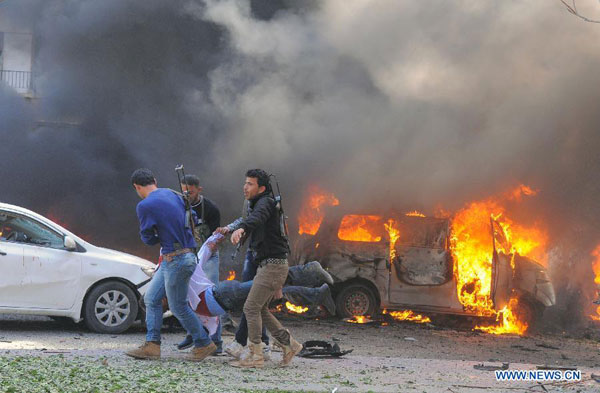Death toll of Damascus suicide bombing up to 53
 0 Comment(s)
0 Comment(s) Print
Print E-mail Xinhua, February 22, 2013
E-mail Xinhua, February 22, 2013
 |
|
A handout picture released by the official Syrian Arab News Agency (SANA) shows Syrians carrying an injured man after a blast in Damascus, Syria, Feb. 21, 2013. [Xinhua/SANA] |
At least 53 people were killed and scores of others injured Thursday when a suicide car bomber detonated his explosive-laden car at a busy intersection in the heart of Syrian capital Damascus near the headquarters of the ruling al-Baath party.
The blasted intersection groups al-Eman Mosque and the Baath party headquarters on the outskirts of the central al-Mazraa district and adjacent to al-Thawra Street.
The blast left images of destruction and carnage, with charred, mingled bodies seen scattered on burnt concrete, as firefighters and paramedics were feverishly trying to help the injured people.
After the blast, the authorities arrested another would-be suicide bomber who was riding a car rigged with explosives in the same area.
The explosion was felt nearly 2 km around the area, shattering glass in nearby buildings and sending smoke plume above the city center. The blast was also followed with heavy gunfire as the authorities cordoned off the area and closed main routes to central Damascus.
Emerging from the rubbles with his soot-stricken face, Abdul- Munim, a Taxi driver, said he was driving nearby when he heard the blast and got hit in the face by the shards of his windshield.
Speaking to Xinhua at the site, Abdul expressed astonishment over the targeted area, saying that "all of these are residential buildings... A lot of passersby were here, too, especially as it was the noon time."
A secondary school student, Nabiala, said she was receiving her grades sheet when she and her classmates heard the big boom.
"We were receiving our grades sheets and feeling so happy, but suddenly we heard the big sound and school windows smashed on us and we started to scream as our teacher lost a finger and other students got hit in the heads," she recounted.
Blasts and mortar attacks have become increasingly common in Syria as the rebels, backed by al-Qaida fighters, scaled up their attacks to wobble the government's grip on power.





